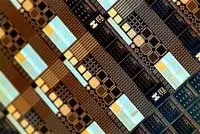 Research led by the University of Southampton claims that memristors could enable the development of implants that use electrical signals from the brain to help treat medical conditions.
Research led by the University of Southampton claims that memristors could enable the development of implants that use electrical signals from the brain to help treat medical conditions.
In a study published in Nature Communications, the researchers showed that memristors could provide real time processing of neuronal signals, leading to efficient data compression and the potential to develop more precise and affordable neuroprosthetics and bioelectronic medicines.
While monitoring the activity of neuronal cells is fundamental to neuroscience and the development of neuroprosthetics, a persistent problem is said to be the inability of devices to process neural data in real-time.
Looking to address these issues, the team developed a nanoscale Memristive Integrating Sensor (MIS) into which they fed a series of voltage-time samples, replicating neuronal electrical activity.
Acting like synapses in the brain, the metal oxide MIS was able to encode and compress by up to 200 times neuronal spiking activity recorded by multi-electrode arrays. Besides addressing the bandwidth constraints, this approach was also found to be power efficient – up to 100 times less per channel when compared to current best practice.
Dr Themis Prodromakis, Reader in Nanoelectronics, said: “We are thrilled that we succeeded in demonstrating that these emerging nanoscale devices, despite being rather simple in architecture, possess ultra rich dynamics that can be harnessed beyond the obvious memory applications to address the fundamental constraints in bandwidth and power that currently prohibit scaling neural interfaces beyond 1000 recording channels.”
Postgraduate researcher Isha Gupta added: “Our work can significantly contribute towards further enhancing the understanding of neuroscience, developing neuroprosthetics and bioelectronic medicines by building tools essential for interpreting the big data in a more effective way.”
The research, supported by an FP7 project involved the University of Southampton, the University of Padova and the Max Planck Institute.
Author
Graham Pitcher
Source: www.newelectronics.co.uk
